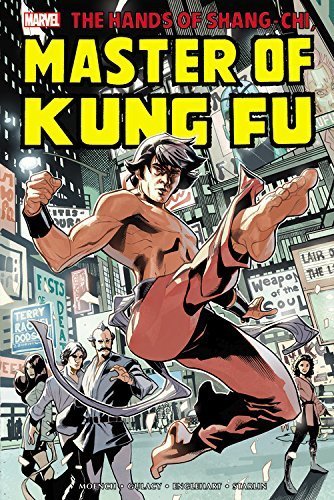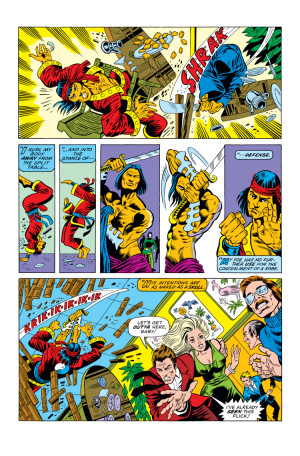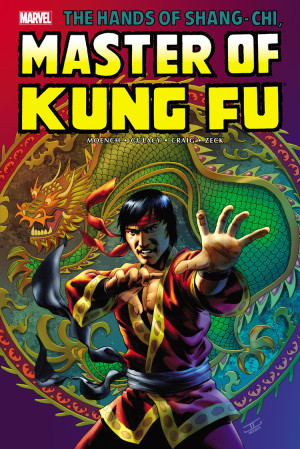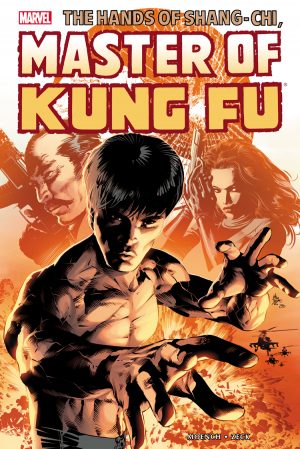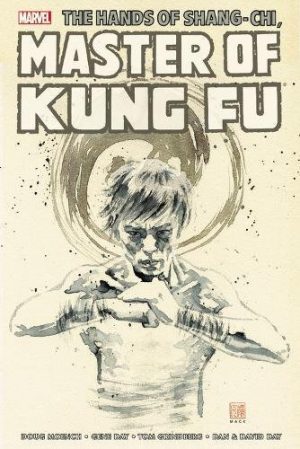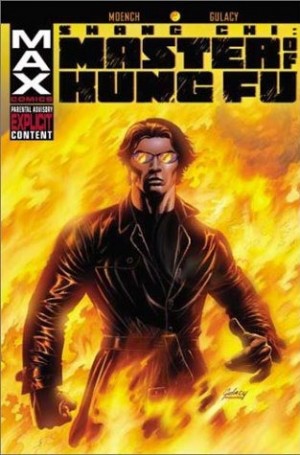Review by Frank Plowright
Marvel had a knack during the 1970s of taking what might be presumed as short-lived faddish concepts and ensuring they became sustained series. Master of Kung-Fu could have been the template. It was conceived when Enter the Dragon was a surprise box office smash, and David Carradine’s Kung-Fu TV show topped the ratings, yet was still being published a decade later. For almost thirty years since it’s been assumed the series would never see book publication due to financial disagreements over the right to use Sax Rohmer’s Fu Manchu and associated characters, primarily Sir Denis Nayland Smith.
It’s long-forgotten now, but the enthusiasm of Steve Englehart and Jim Starlin sparked the original series, accepting an editorial suggestion that they graft characters from Rohmer’s novels, to which Marvel had recently acquired the rights. Fu Manchu become father to Shang-Chi, a teenage kung-fu prodigy raised to become his father’s perfect assassin. This didn’t work as planned, and he instead joined the forces of British spy organisation MI6, headed by Nayland Smith. The creators also supplied Black Jack Tarr, MI6 operative, a giant of a man, and one whose brute strength was almost a match for kung-fu. Starlin’s blocky style is surprisingly graceful in defining the lead character, and Englehart’s introduction spirited, but both left the series due to editorial disagreements.
Marvel Comics: The Untold Story reveals these involved increasing the violence at the expense of the spirituality the series creators considered essential. Their successor Doug Moench would eventually return this in spades, but started out as a more compliant writer, and the results are very ordinary. Fu Manchu attempts to destroy Mount Rushmore, or kung-fu is matched against Amazonian tribesmen. Any wonder in Moench’s earliest material is the developing art of Paul Gulacy. He begins in thrall to the artistic style of Jim Steranko, and for all the learner’s mistakes he makes, there’s a grace and delicacy to Gulacy’s work coupled with increasingly confident page designs, although there’s a variance depending on the work the inker puts in. Previously only ever seen on pulp paper where they impressed, they’re glorious at times when reproduced on quality paper stock.
Work of that quality and thoughtfulness required more time to produce than the regular thirty day publication deadline, which also included a quarterly giant-sized issue. Fill-ins are plentiful and largely mediocre, but Gulacy can render credible a ridiculous character like Razor-Fist, who’s amputated his hands and forearms to replace them with sword blades.
The material stops short of Moench and Gulacy’s finest collaborations, but towards the end there’s much to admire. Moench successfully infused the best aspects of spy thrillers with the kung-fu action, and added to the cast, with agents Clive Reston and the alluring Leiko Wu, also very capable.
A playful quality would later disappear. There’s a teaming of Shang-Chi with a never named person bearing an uncanny resemblance to Carradine, a character based on Groucho Marx, and Reston constantly hints at (never named) ancestry of James Bond and Sherlock Holmes. The missions Moench constructs become ever more fantastical, culminating in an entirely artificial funfair style island complete with a large eyed robot servant, housing a Bond style criminal mastermind. That’s very satisfying over four parts and the pointer to what would come.
While there are elements of their time, Master of Kung-Fu hasn’t dated as much as other 1970s Marvel product because narrative captions were established from the start in preference to thought balloons. The series highlights begin with the next volume. The Epic Collection Weapon of the Soul presents this content in paperback finishing just before the James Bond pastiche.
